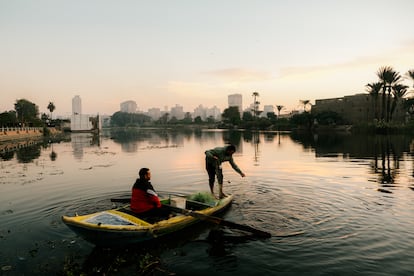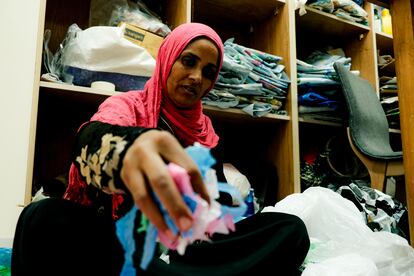The plastic fishermen of the Nile
Egypt is responsible for more than 40% of the plastic waste dumped in the Mediterranean, and its iconic river is increasingly polluted. Collecting and selling waste plastic that is then reused is a way to compensate for the lost income due to the scarcity of fish

Dawn breaks over Cairo with the first rays of sun filtering through the morning haze over the Nile River. Islands of different sizes — some developed, others not so much — emerge from the twilight, and several fishermen begin their day.
Arafa Saber and his brother Mohamed paddle in silence through the calm waters. The river dampens the noise of the chaotic city of more than 20 million inhabitants that is beginning to wake up. Carefully, he casts his net and collects his catch. “My father was a fisherman, and after he died, I had to take care of my mother, so I started doing the same job,” he says. But, unlike his father, this 37-year-old man, who has been fishing for more than 25 years, seeks not only to catch fish from the water, but also increasing amounts of plastic.
Saber lives on the island of Qursaya, a small two-kilometer stretch of land where about 5,000 people live and which, like the neighboring islands of Dahab and Warraq, a little further north, sits in the waters of the Nile as if time had passed more slowly there, far from the restless megacity. Many of the brothers’ neighbors are originally from rural areas of southern Egypt and have been fishing or tending livestock for generations. In recent years, however, the presence of fish in the river has been decreasing due to pollution, so collecting plastic has become an increasingly common activity among the fishermen of these islands. “Now I focus more on collecting plastic than fish to provide an income, but also to clean up the river,” Saber says.
A 2019 study by the World Wide Fund for Nature (WWF) concluded that Egypt is responsible for more than 40% of plastic waste dumped in the Mediterranean, some of which comes directly from the Nile. In total, the research noted that the country dumps around 1.3 million tons of untreated plastics every year.

The fish that live in the Nile are the direct victims of this problem. Although no comprehensive studies have been conducted, small-scale research in 2020 dissected and examined the gastrointestinal tracts of a sample of two different species of Nile fish purchased from vendors in Cairo. The study found that more than 75% contained microplastics, one of the highest levels in the world.
In an attempt to combat this invasion, a group of Egyptians began organizing weekly meetings in Cairo to clean the waters of the Nile. But, the scale of the challenge was enormous. In 2018 they decided to promote the VeryNile initiative by purchasing the plastic that the islands’ fishing communities collect from the river. “When the plastic project was born, I was working as a fisherman, so I decided to try it to increase my income and also to clean the river,” explains Saber. “Before the initiative, the Nile was a very dirty place,” recalls the fisherman, who notes that “now there is a big difference, not 100%, but 1,000%. There are more fish, the Nile is cleaner, the smell is better, everything.”
One of the first to join the project was Arafa Gaber, a 50-year-old fisherman born and raised on the island of Warraq, north of Cairo. He began catching fish in the Nile during his first year at primary school and under the wing of his father, the local fishermen’s leader. Gaber notes that pollution in the river began to be a problem 25 or 30 years ago, and says that the lack of income and future prospects for his profession convinced him to join the plastic fishing business.
Research examined two species of Nile fish purchased from vendors in Cairo and found that more than 75% of them contained microplastics, one of the highest levels in the world.
“We have children and we want them to be educated. That’s why we signed up. What I like most is improving the Nile, because at first people benefited [from it] as fishermen, but when it started getting very polluted, it affected the environment and it affected the fish, since plastic products are not easy [to break down],” explains Gaber. He is in charge of collecting the plastic collected by a group of fishermen from the island of Warraq and taking it to Qursaya, where the VeryNile facilities are located. Once there, the waste is separated, the bottle caps are removed and compacted, says Hana Tohamy, who is in charge of raising awareness for the initiative. The lower quality plastic mixture is then sent free to a company in Asyut, a city almost 250 miles from Cairo, where it is converted into an alternative fuel, while the higher quality plastic is sold to a recycling factory in Cairo. Currently, the project has more than 100 fishermen from different parts of Egypt who work every day collecting plastics from the Nile. They collect between 20 and 30 tons per month, says Tohamy.
To offer more opportunities to the inhabitants of Qursaya, some of the plastic that was removed from the Nile is used (after being processed) in a workshop that employs more than 20 people full-time, most of them women. There, the recycled plastic takes on new life to produce bags, computer cases, and other accessories.
“Before the initiative, the Nile was a very dirty place,” recalls the fisherman, who notes that “now there is a big difference, not 100%, but 1,000%. There are more fish, the Nile is cleaner, the smell is better, everything”Arafa Saber, pescador
Umm Kamel, a 48-year-old resident of Qursaya whose husband is a fisherman, is one of four women who started working at the facilities when they were launched more than three years ago. Her family’s situation at that time was beginning to get critical. “The women of Qursaya do not [usually] work, and their husbands are fishermen, so there is not enough income,” says Umm Kamel, who works mainly as a seamstress. “Work here opened up our homes, our children’s education, and fixed [our] lives, as [we lived] under a lot of pressure. Thank God, now we are all better,” she says.

“Since the company opened, it has benefited us and many people,” agrees Umm Donia, another resident of Qursaya who started working in the workshop due to the low income her husband earned. “I hope it continues to grow because there are still many people in need on the island [...] Most of our men are fishermen. One day [my husband] brought me eight pounds [of fish], another day two pounds. One day he went fishing and there was nothing,” the mother of four school-age children recalls.
Aware that the fishermen of Cairo alone cannot take on the titanic challenge of cleaning the extensive Nile of plastics, VeryNile hopes to be able to replicate the initiative it launched in the Egyptian capital in other cities in the country, whose population is concentrated almost exclusively along the narrow lifeline that the river forms until it reaches the Mediterranean. “We are trying to make all models sustainable, and we want the impact to continue. That’s why we are expanding to other cities. We started in Asyut and now we are looking for fishermen in Menia [a city 155 miles south of Cairo],” Tohamy explains.
Back on the banks of the Nile, Saber comments that, beyond the income, the initiative has also become a source of personal satisfaction. “I am happy because my six-year-old son likes the project, he comes with me and tells me that he is proud of what I do.”

Sign up for our weekly newsletter to get more English-language news coverage from EL PAÍS USA Edition
Tu suscripción se está usando en otro dispositivo
¿Quieres añadir otro usuario a tu suscripción?
Si continúas leyendo en este dispositivo, no se podrá leer en el otro.
FlechaTu suscripción se está usando en otro dispositivo y solo puedes acceder a EL PAÍS desde un dispositivo a la vez.
Si quieres compartir tu cuenta, cambia tu suscripción a la modalidad Premium, así podrás añadir otro usuario. Cada uno accederá con su propia cuenta de email, lo que os permitirá personalizar vuestra experiencia en EL PAÍS.
¿Tienes una suscripción de empresa? Accede aquí para contratar más cuentas.
En el caso de no saber quién está usando tu cuenta, te recomendamos cambiar tu contraseña aquí.
Si decides continuar compartiendo tu cuenta, este mensaje se mostrará en tu dispositivo y en el de la otra persona que está usando tu cuenta de forma indefinida, afectando a tu experiencia de lectura. Puedes consultar aquí los términos y condiciones de la suscripción digital.









































